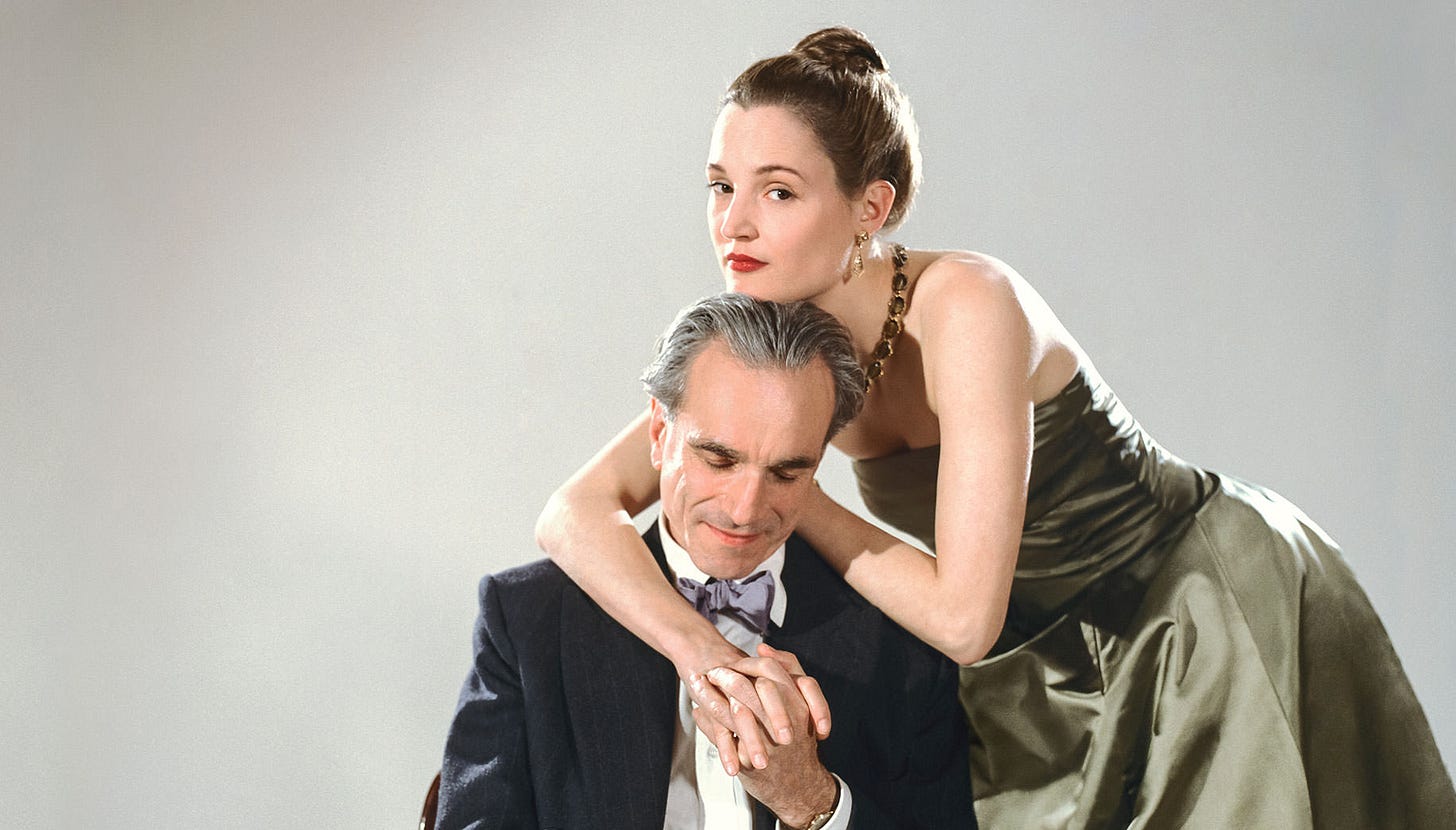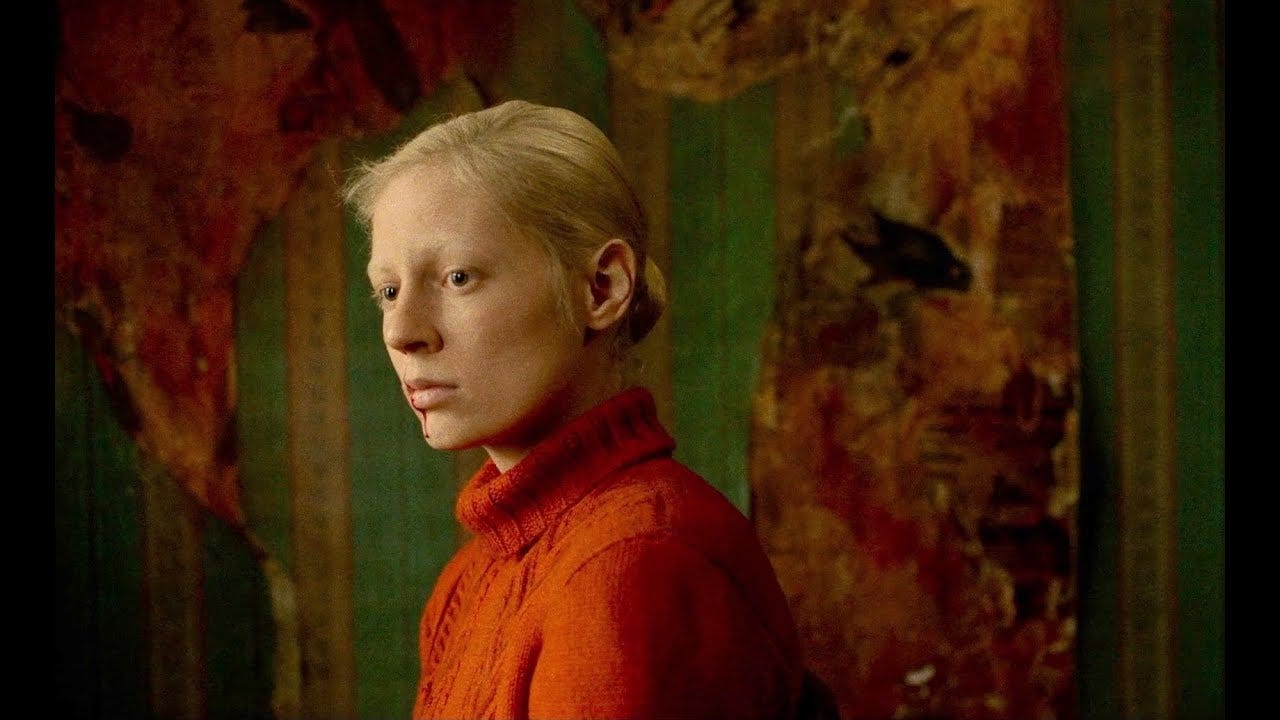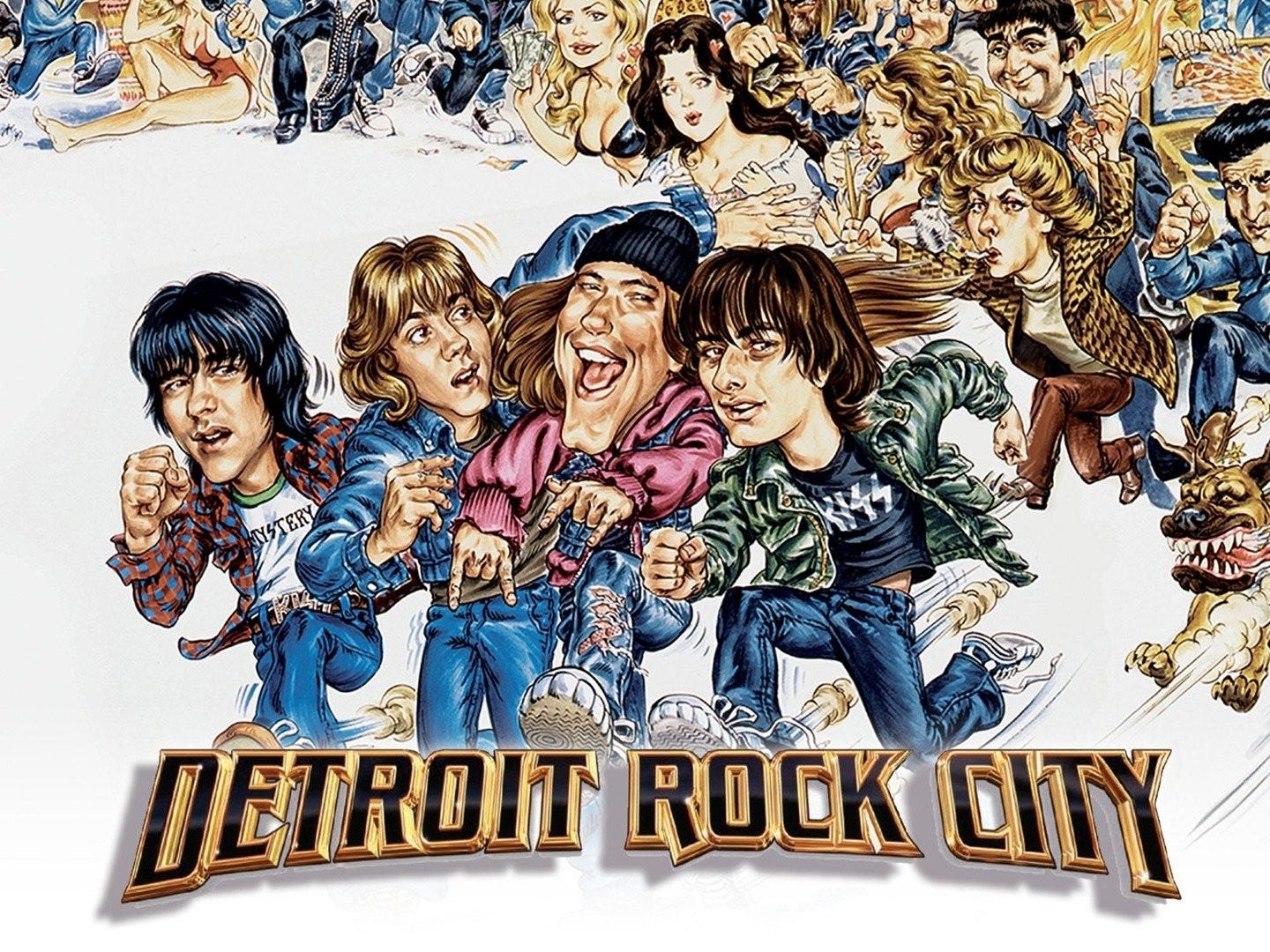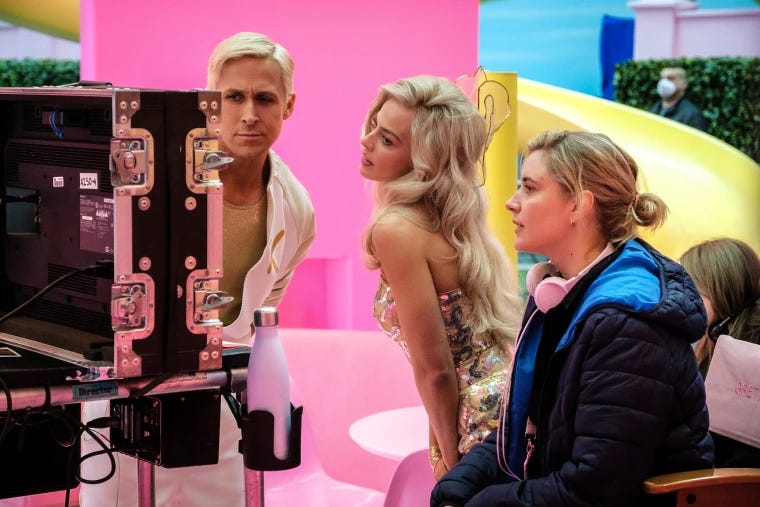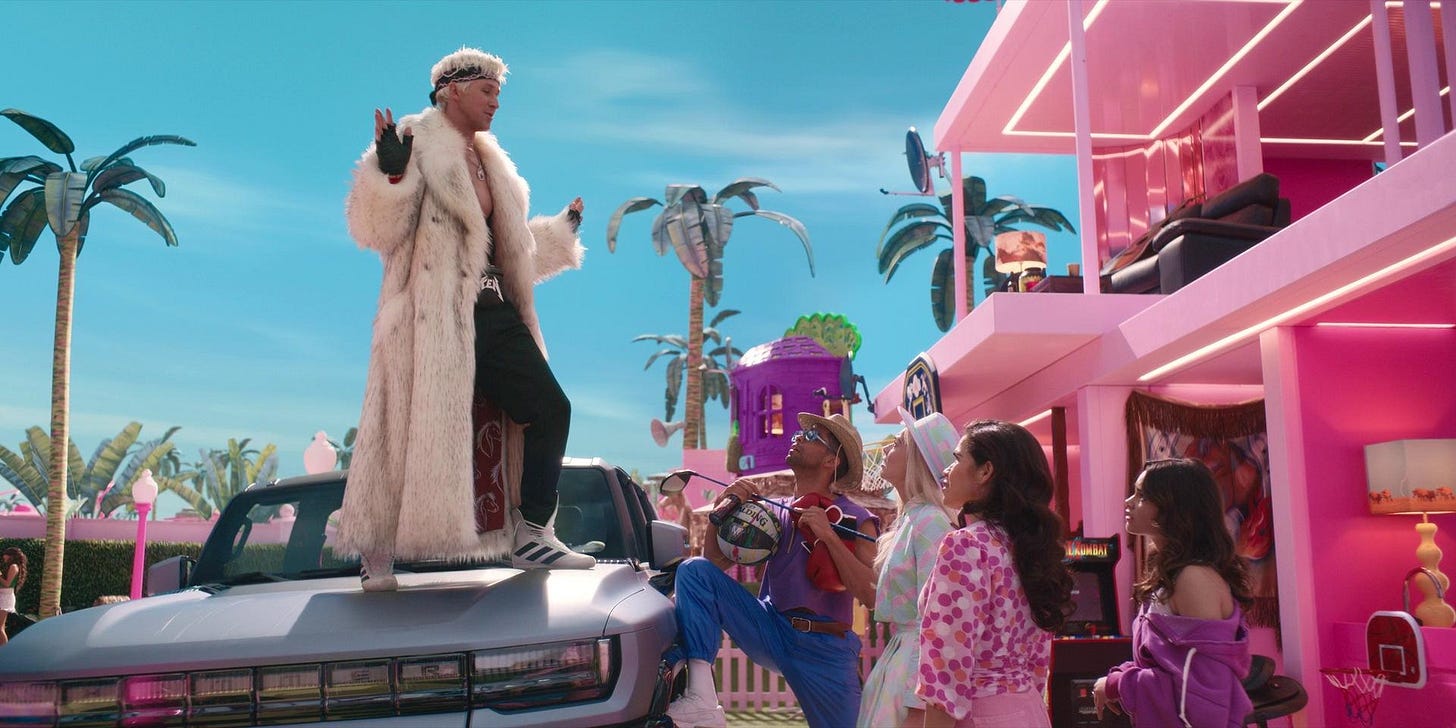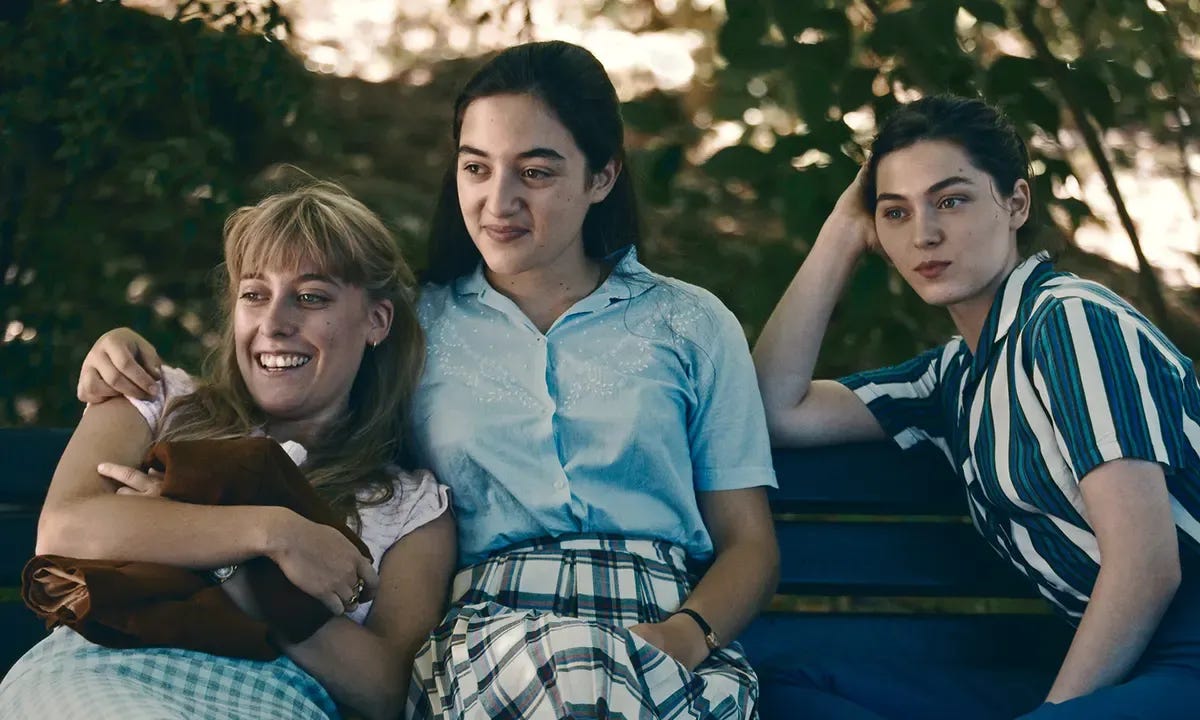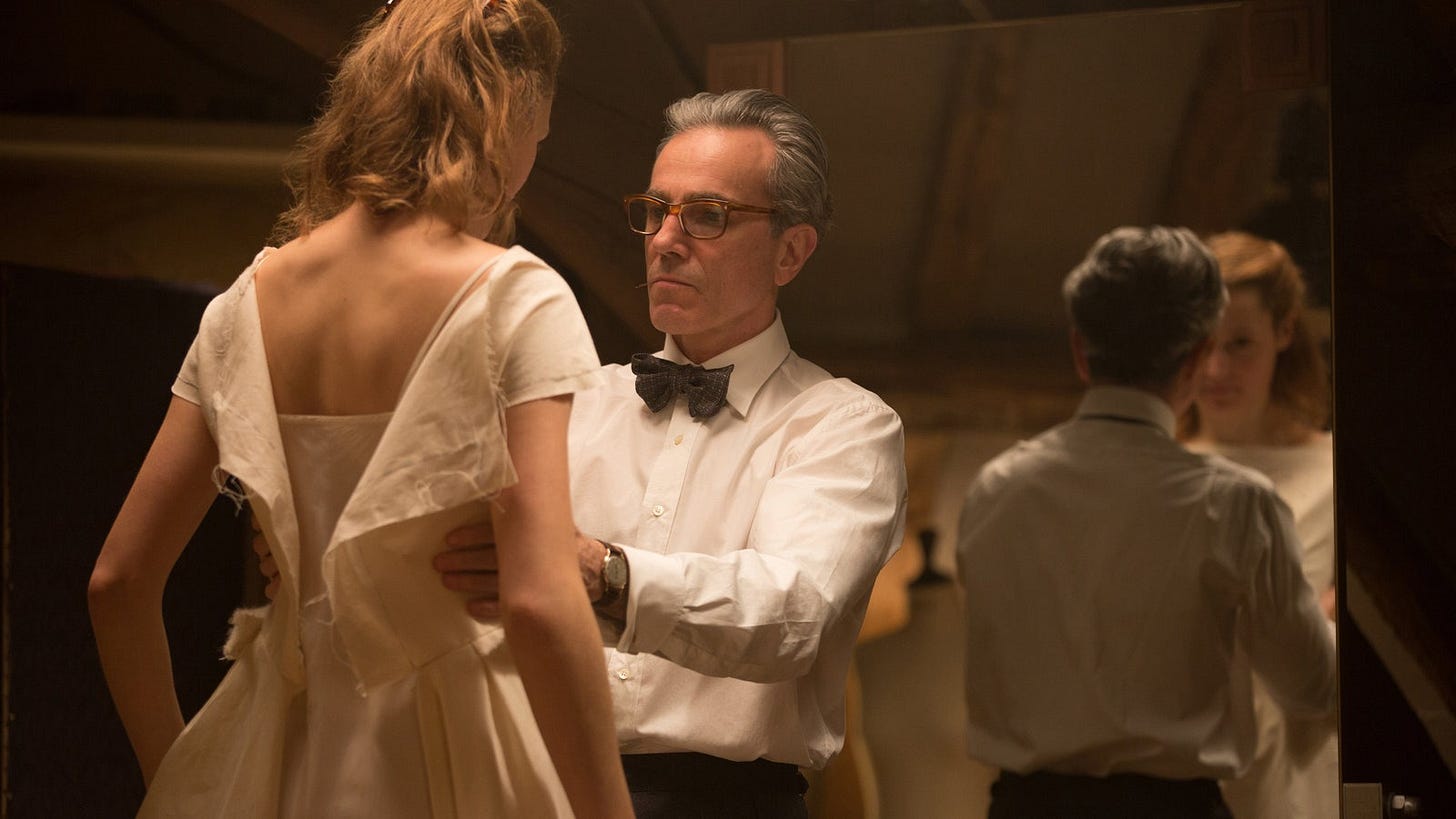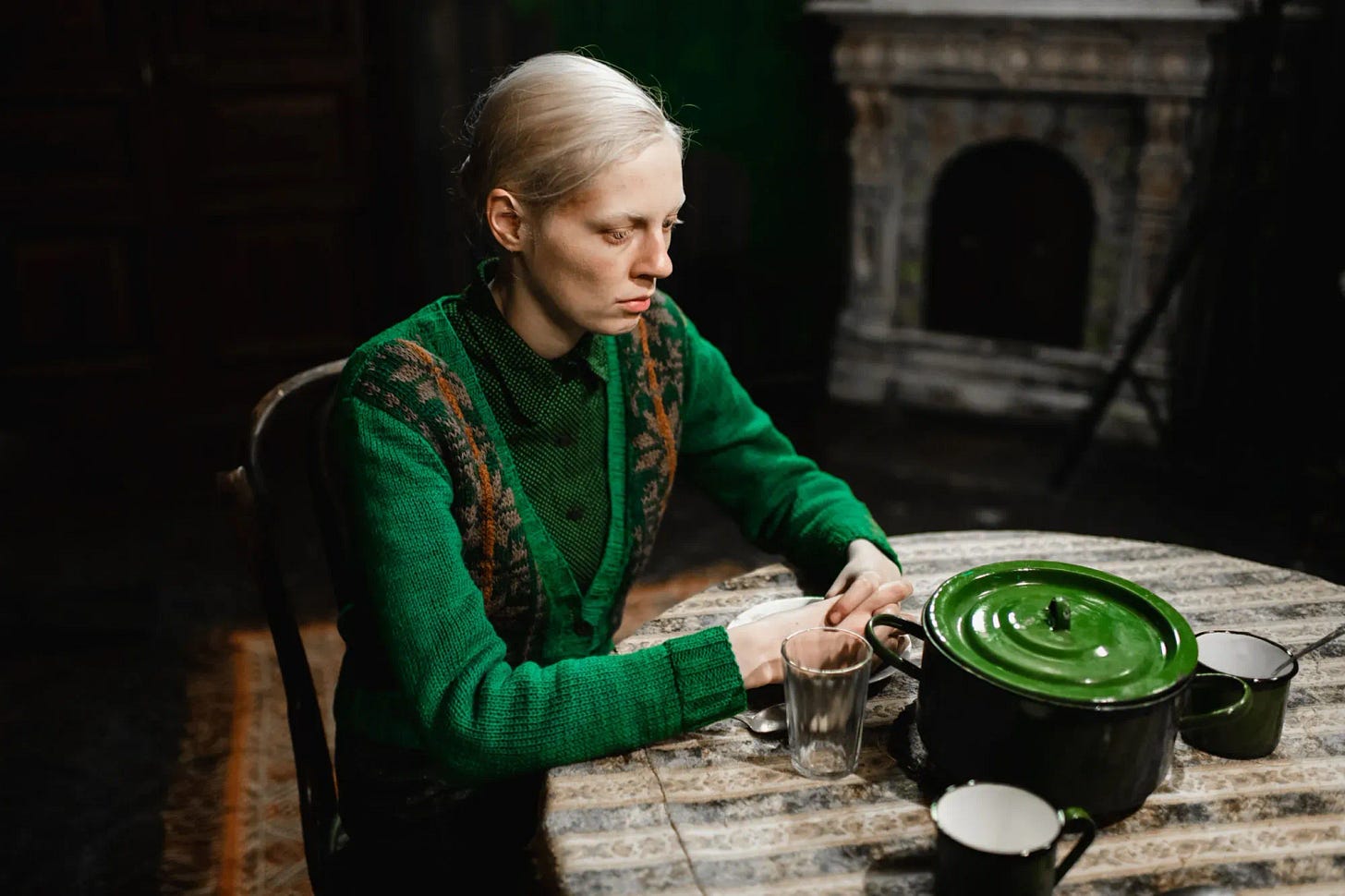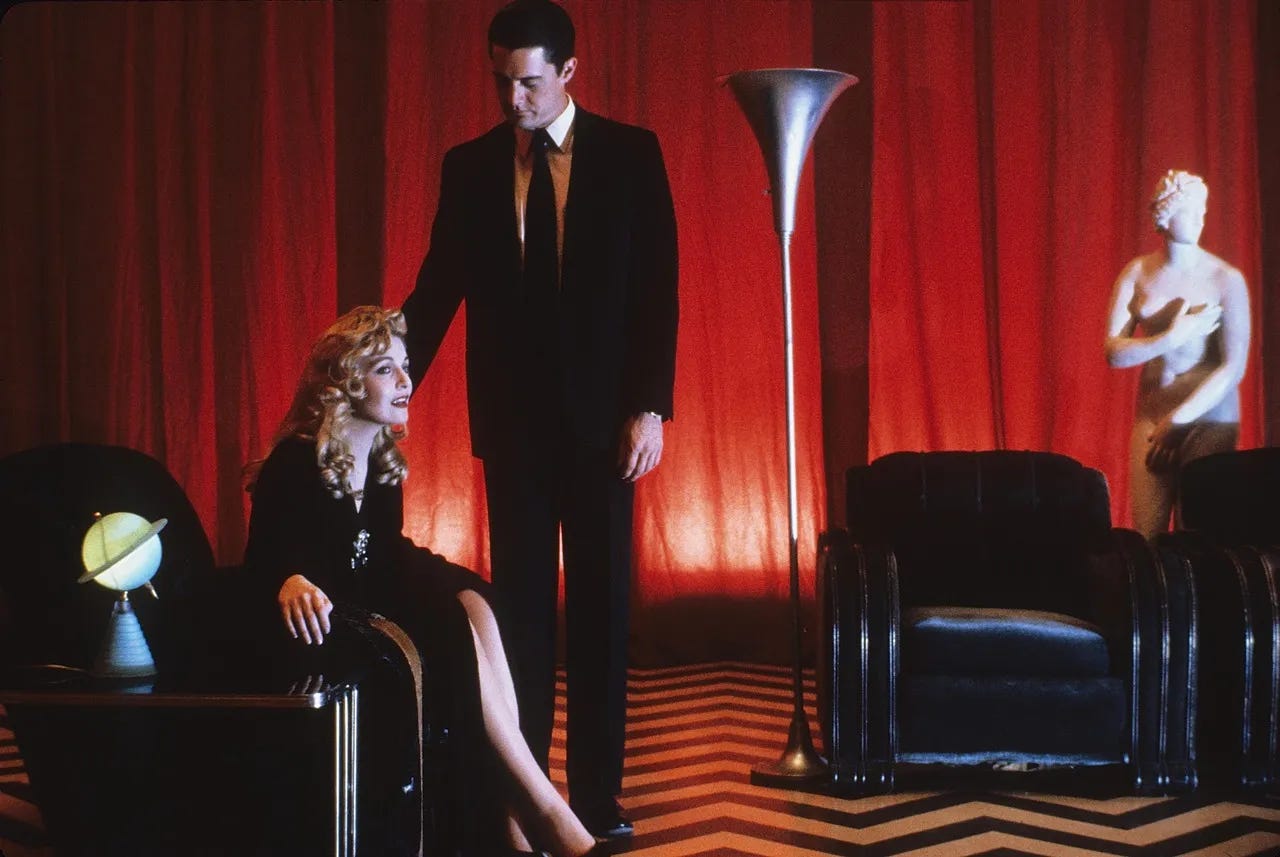[EDITED BY: GRIFFIN SHERIDAN]
Hello and welcome back to an all-new installment of BEAM FROM THE BOOTH brought to you by GRAND RAPIDS FILM SOCIETY!
We’re just days away from February, which means it’s time to take a look at the exciting events we have planned for you all in the coming month, starting with...
SUNDAY, FEBRUARY 4th: HAPPENING (2021)
From French director Audrey Diwan and presented by the CHIAROSCURO INTERNATIONAL FILM SERIES, HAPPENING follows a student that takes matters into her own hands when she discovers she is pregnant in this 60s-set thriller. Like all Chiaroscuro screenings, admission is FREE TO ALL, and the film will be followed by a panel discussion and reception with refreshments.
WEDNESDAY, FEBRUARY 14th: PHANTOM THREAD (2017)
We are so excited for this one. Appreciation for PTA’s romantic drama seems to only grow as the years go on, and that appreciation was certainly present within the GRFS Board. We’ve hoped to screen PHANTOM THREAD for some time now, and we finally found the perfect day to do it: St. Valentine’s Day.
So tell your significant others, dates, or even just a friend or two that you’ll be spending this Valentine’s at the Wealthy Theatre for this contemporary classic.
SUNDAY, FEBRUARY 18th: BEANPOLE (2019)
Another selection from our friends at the CHIAROSCURO INTERNATIONAL FILM SERIES, this World War II-based drama from Russian director Kantemir Balagov follows two young women searching for meaning and hope during their struggle to rebuild their lives amongst the ruins of Leningrad. Again, this screening is FREE TO ALL and will also feature a panel discussion and reception with refreshments.
SATURDAY, FEBRUARY 24th: TWIN PEAKS: FIRE WALK WITH ME (1992)
We had such a blast celebrating TWIN PEAKS DAY last year with our screening of the first two episodes of the iconic television show on the big screen that we just had to do it again this year. Join us for a screening of David Lynch’s feature film that acts as both prequel and conclusion to the original series, FIRE WALK WITH ME. Just like last year, we expect to see everyone dressed as their favorite Twin Peaks characters!
Last year’s Twin Peaks Day event remains our highest attended event ever, so be sure to snatch your tickets for this one ASAP!
...and stay tuned for more details about this special event.
***
We cannot wait for each and every one of these, and we look forward to seeing you all there for what will surely be another month of memorable evenings at Wealthy Theatre. As always, find links to purchase your tickets for these screenings in our ‘Upcoming Events’ section further down.
And don’t forget that amidst everything GRFS has to offer in February, the fine folks at Wealthy Theatre will also be hosting their staple Tuesday Movie series every week, and our own Nicholas Hartman has a few fond memories of this week’s selection...
THIS WEEK’S TUESDAY MOVIE:
DETROIT ROCK CITY
[BY: NICHOLAS HARTMAN]
In a dark and smelly basement, four teenage boys dressed in all black, skeletal make-up, and shredded attire bang their heads to the sound of screeching guitars. The cheap drum set makes the windows of the basement rattle, and the screeching vocals makes every parents’ hair in the neighborhood stand on end.
These boys are in a cover band — a Misfits cover band to be exact. It’s their life. They live and breathe all things Halloween; they practice on end trying to perfect their craft knowing that at some point...they’ll hopefully put on a live show. The Misfits are their life just as the band KISS is the life of the characters in the cult classic film Detroit Rock City (Adam Rifkin, 1999).
Detroit Rock City is one of my all-time favorite coming-of-age flicks. It’s a film that brings me back to my youth. The days of teenage angst, of not caring, and getting into trouble.
It’s a film that I watched religiously with my close friends; a film we put on before our band practice. They covered KISS songs, we covered The Misfits. They hate disco, we hate pop music. They dress in smelly jean jackets, we dress in smelly leather jackets. They rock n’ roll all night...we party every day.
For me, Detroit Rock City goes beyond a movie experience. It reminds me what it feels like to be young again. It takes me back to the hallways of my high school. The days my friends and I were shoved into lockers for our choice of clothing. The film reminds me that every generation has their rock n’ rollers, punk rockers, metal heads, and outsiders. More importantly, it reminds me of the importance of friendship: that no matter how much you’re made fun of, you stick together. You still wear your outfits with pride, you still blast your music, and you’ll always have each others’ backs.
If Detroit Rock City doesn’t make you want to get in trouble with your friends, then I don’t know what will. You only live once, enjoy it. Blast your music loud, go on a road trip, stay up past your bedtime, eat a cheeseburger, drink some beer, and let go once in a while.
Life is about making memories, and I ask you all to come make a new memory with me this Tuesday, January 30th as we screen one of my all-time favorites: Detroit Rock City.
PARTNER PICKS WITH GRAND RAPIDS PUBLIC LIBRARY
[FEAT. MATT EVERITT]
Inspired by series like Criterion’s Closet Picks and Letterboxd’s Four Favorites, GRAND RAPIDS FILM SOCIETY and our friends at the GRAND RAPIDS PUBLIC LIBRARY have teamed up to bring you all PARTNER PICKS: an ongoing series of brief videos featuring a member of the GRFS Board as they browse the vast and varied selection of films (and television!) available to check out at our local library.
In this first installment, check out what our own Matt Everitt pulled off the shelves...
If you’re interested in reading more about Matt’s full list of recommendations, check out GRPL’s curated list. Access these films and thousands more on shelves or online with your GRPL library card.
A very special thanks to GRPL’s HAILEY JANSSON for arranging, shooting, editing, and sharing this super fun series.
Stay tuned for another installment of Partner Picks very soon!
ROAD TO THE OSCARS 2024
WHAT THE BARBIE “SNUB” DISCOURSE MEANS ABOUT THE OSCARS...AND US
[BY: KYLE MACCIOMEI]
This article will be the first in a series of Beam from the Booth articles covering the upcoming 96th Academy Awards. Continue to check back in throughout these next few issues for further thoughts and commentary on this year’s awards.
Zazie Beetz and Jack Quaid took the stage as the cameras went live Tuesday, January 23rd, at 5:30am in Los Angeles, California. Twenty-minutes later they announced the slate of nominees for the 96th Academy Awards. Little did they know that a storm was brewing. A very online, extremely divisive, and unending hell had just been unleashed on the film community. This chaos can be quite normal on any given year when the nominations are announced for the Oscars. Before this week, many controversies have plagued the Academy voting process, such as The Dark Knight not being nominated for Best Picture, Green Book taking home the biggest prize of the night, and Shakespeare in Love beating Saving Private Ryan.
But this year, the Oscar backlash was maybe the most concentrated and tangible it has ever felt. If you weren’t aware, the heated discourse™ was abuzz following the announcement for the 96th Academy Awards, with primary focus being put squarely on Barbie, Greta Gerwig, and Margot Robbie. While Barbie came away with 8 nominations in total, it did miss out on two major categories that early predictors thought it had a strong shot in: Robbie for Best Actress and Gerwig for Best Director.
The media cycle that followed began simple enough. Major outlets reported on the nominees, with headline mentions of the unexpected snubs. Then a trip to X/Twitter would show an overwhelming populist outcry of injustice. If you took a hop, skip, and a jump over to Tiktok, things were at a boiling point. There was a genuine sense of rage and shock that flooded the platform, with one TikTok saying, to paraphrase, “I heard a collective gasp and then sigh from every woman in the world when the nominations were announced.” It was here that the pundits started jumping in and speaking up. Then came the PR apologies laced with regret. Ryan Gosling and America Ferrera, both nominated in supporting roles for Barbie, felt it was necessary to be thankful for their own recognition while showing disappointment in how it could not be shared with their colleagues. After that were the opinion pieces and punditry, where discussions of sexism and systemic oppression abound. Quotes from Ferrera's monologue at the end of the film were inescapable: “Always stand out and always be grateful, but never forget that the system is rigged.” Even John Stamos joined the fray!
This was of course amplified by the optics of the situation, where Gosling’s Ken, as previously mentioned, received a nomination for Supporting Actor where Margot’s Barbie did not. A film that expresses an empowered vision of womanhood, patriarchal advantage, and feelings of gender-based exclusion was now, seemingly, experiencing that exclusion first-hand. Even after becoming the first female-directed film to earn a billion dollars at the international box office ($1.4 billion to be exact), Barbie, in the eyes of many, couldn’t escape the recurring marginalization that women (and films depicting womanhood) face in film.
Those experiences are extremely valid. Women in Hollywood account for only 22% of leadership in roles behind the scenes (directing, writing, producing, etc.), a number that has only risen 5% since 1988. In terms of characters, only 33% of films portrayed sole female protagonists, and the percentage of total speaking roles that were women was only 37%. In film criticism, men outnumber women 2 to 1. In film school, I had a very talented female classmate who worked as a gaffer on many sets. If she had decided to become a professional in that role, she would have joined the 1% of women who held that position in major Hollywood productions.
These trends speak only to quantitative analysis of professional representation, and nothing to the general sexism that has and will continue to exist in the field. The #MeToo movement has forever altered the public’s perception of the film industry and what its female talents have to endure within it. Hollywood is famously a boys club, and those biased tones persist from film school all the way to the studio boardrooms.
This context is helpful in understanding why there was such an immediate reaction to the Barbie snubs and how an atmosphere lacking equity would allow cultural critics across the board to cry foul with anger and indignation. But what was lacking in all of this discourse™ was a singular force to align the outrage into a single message.
Enter Hillary Rodham Clinton.
Having a former US Senator, Secretary of State, and presidential candidate compare her loss at the electoral college while also winning the popular vote to a failed Oscar nomination felt disconnected from reality. It felt like we lost the plot.
It was at this point that backlash had reached its peak and public sentiment was about to switch from sympathetic to critical. It was pointed out that Barbie was properly recognized by being the fourth most-nominated film for this year’s ceremony, an astounding achievement that is highly coveted by any filmmaker and their team. Accusations were made that Barbie, no matter how creatively fulfilling and subversive it might be, is ultimately just a tool for Mattel to begin their own toy box cinematic universe. Opinion columnists argued that, in this climate, Barbie critics are silenced in the fear of having to beat back allegations of misogyny. Elsewhere, detractors of this newly-formed culture war made it clear that Gerwig and Robbie were actually nominated for their work, just in other categories. Gerwig received a screenplay nomination alongside her co-writer and husband, Noah Baumbach, and Robbie received the Best Picture nomination for her producing work on the film.
On social media things were even more intense. The cultural dialogue surrounding the nominations was so focused on the two Barbie snubs that it took attention away from real achievements and progress that were being made elsewhere. Lily Gladstone, who gives a breathtaking performance in Killers of the Flower Moon, became the first Native American woman to be nominated for Best Actress (and should she win, she will be the second indigenous person to ever take the stage for a competitive Oscar win). Coleman Domingo became the first Afro-Latino nominated for Best Actor, and alongside Jodie Foster became the first time two LGBTQ actors were nominated for playing LGBTQ characters. And Celine Song made history as the first Asian woman nominated for Best Original Screenplay for Past Lives. Overall, this year marks the first time that more than one film nominated for Best Picture does not have English as its primary language, and it is also the first year that three Best Picture nominees were directed by women. Even Whoopie Goldberg joined the fray!
The lack of discourse covering these achievements and progress towards representation at the Oscars led to criminal indictments targeting the greatest threat to progressive politics: White Feminism. In the world of white feminism, the success and failures of white women are prioritized while any space in the conversation for other marginalized voices is neglected. Picture someone wearing earbuds jamming to Taylor Swift’s “The Man” while ignoring the privilege that exists for women like Greta Gerwig and Margot Robbie. Gerwig has already been chased by charges of centering white feminism in her work, and the Barbie Backlash is now the smoking gun evidence of the culture she has supposedly cultivated.
All of this is to say: it was not very fun to be an online film fan this week.
So now that we’ve successfully recapped this week’s series of events, where does this article continue? This article, written by someone who exhibits nearly every dominant social class in America and published by a local nonprofit whose board skews overwhelmingly male and white — what ideas can this article contribute to the conversation?
Well first, I think I’ll state clearly that I have a lot of empathy for anyone who feels that the Academy of Motion Picture Arts and Sciences does not properly reflect the talent and craft of marginalized voices. Historically, oppressed groups have not received a fair share of recognition by this voting body, and the #OscarsSoWhite movement of 2015 was arguably the most influential social pressure to change the way the Academy functions. A 2012 investigation by the LA Times revealed that Oscar voters were 94% white, 77% male, and less than 14% of its membership was below the age of 50. Since the backlash, the Academy has made much-needed changes to increase representation amongst its membership, and with that positive change we have seen a sizable increase in nominations and awards for these groups. Representation still has a long way to go, though, especially with regards to hiring and casting new voices from a production perspective.
But in my opinion, arguing that sexism was the primary bias at play in Robbie and Gerwig losing their nominations is actually giving Academy voting members far too much credit. We know that Oscar nominations and wins are often decided on whims that are far more petty and myopic than most could ever imagine. These awards are determined by a variety of factors, and I would say that a film’s “quality” has only a small part to play. To even get a nomination from the Academy, you need a combination of critical recognition, charisma, timing, advertising, and a bit of luck.
People believe that Academy voters are selecting nominations based solely on the craftsmanship displayed in their film, but that is far from the truth. In reality, Oscar voting is much closer to the Survivor jury system, where a final victor is not always chosen based on who exhibited superior strategic prowess but instead who the jury just liked more. Yes, you absolutely need to be talented in your job to receive a nomination, but you also need to attend Oscar parties, have a studio-backed campaign to boost your exposure, have fun moments of virality, and go on an endless press cycle that will validate your accomplishments and achievements.
Just look at America Ferrera, another big surprise on Tuesday when she received her nomination. She herself was not expecting to be recognized in this category, nor did any major precursors have her on their predicted shortlists. Industry experts believe that America’s late-surge in popularity came from an extremely praised acceptance speech she gave at the Critics Choice Awards back on January 14th. The charm, beauty, and confidence in the words she spoke had a real impact on a large room full of Academy voters who were just about to cast their ballots. That speech, combined with her many years of hard work in the industry and an impressive performance in one of the most talked-about films of the year, gave her the boost she needed to receive a nomination this year. Had she given that speech just one week later when voting had closed, there is a strong possibility that she wouldn’t have been top-of-mind for many voters who cast their ballots in that period.
This is historically how the Academy functions, and it will likely always continue to operate. Voters decide their nominations based on what feels right to them, and what feels “right” can be so many things. Just look at Annette Bening, the now five-time Oscar nominee who essentially beat out Margot Robbie for a spot in the Best Actress category. With not a single win under her belt, the Academy seems to have felt that she was overdue for some recognition after losing so many times in the past. We call this the Glenn Close Conundrum, named after the 8-times nominated actress who has never actually taken home the gold. Sometimes, voters just nominate someone as an apology for not properly recognizing them in prior years. With this, instead of voting for Margot Robbie, Academy members seemed to buy into Netflix’s aggressive campaign to give Bening the recognition she deserved for her physically challenging and transformative performance in Nyad. Because of this, Robbie missed out in a category where Carey Mulligan, Emma Stone, and Lily Gladstone were clear locks.
Hopping over to Best Director, we can see a similar lock for Christopher Nolan, Yorgos Lanthimos, and Martin Scorsese. In order for Gerwig to be recognized, she would have to beat the Palme d'Or winner Anatomy of a Fall and the hauntingly innovative Holocaust film The Zone of Interest. The directing branch of the Academy has grown its international presence over the past few years, which would explain why more foreign directors are being recognized both in this category and others. On top of this, directors can often have a stigma against big budget, IP-driven studio comedies, which Barbie embodies perfectly. Do their members also exhibit biases towards women and films that depict girlhood? Absolutely. But Gerwig’s spot was most likely taken by Anatomy of a Fall’s director Justine Triet, an unapologetic feminist filmmaker who has become a real star on the circuit these past few months.
Taking a step back — what does this all mean? Well first, there is a more nuanced understanding of the situation that undermines a lot of the accusations of blatant sexism and misogyny with regards to these nominations. But also, that’s not an excuse to dismiss calls for reform and change to the antiquated and systemically unfair institution of Hollywood film production. But more importantly, it is usually unhelpful to point to a single snubbed nomination (or even a pair) as evidence of a social disease. These ailments of representation and agency are widespread and affect a diverse range of groups, and taking into account the wide range of stakeholders who are harmed by these practices is most helpful for building a coherent worldview.
But back to Oscar talk: what can we predict for the ceremony to come? For one, the odds of Greta Gerwig winning Best Adapted Screenplay have just shot up a great deal. Academy voters have a desire to uphold their reputation, and all of this drama has put the public’s already shaky faith in the institution in question. So this very well could be a repeat of the 85th Oscars when Ben Affleck was snubbed from the Best Director category for his film Argo, and so the Academy more-or-less decided to award that film Best Picture as an apology for their indiscretion.
We can also foresee that, in the future, both Gerwig and Robbie will receive an endless parade of recognition from Hollywood awards for future work that might range in quality from spectacular to middling. That’s how this body often functions. You establish yourself as an icon and then reap the benefits for the rest of your career. Gerwig has already proven herself by being the first director to have all three of her first solo-directed films to be nominated for Best Picture, a feat unlike anything we have seen before from a still-rising star.
In the end, I have no doubt that Gerwig and Robbie will play their careers flawlessly in the decades to come, and that they will continue to dominate in bringing cinematic experiences to the center of cultural consciousness. All of this will be in spite of the decades of belittlement and erasure they have had (and will continue) to endure. Now as the Barbie backlash, the backlash-to-the-backlash, and the exhaustive discourse subsides, I look forward to seeing how this year’s Oscars play out — petty details and all.
Special thanks to Kirsten Fedorowicz for editing assistance.
UPCOMING EVENTS
HAPPENING (presented by CHIAROSCURO INTERNATIONAL FILM SERIES)
WHAT: In 1963, student Anne has a bright future ahead of her, but her dreams of finishing her studies is shattered when she becomes pregnant. As her final exams approach, Anne decides to take matters into her own hands. (FREE screening followed by discussion and reception)
WHEN: Sunday, February 4th, 2:00pm
WHERE: The Wealthy Theatre
PHANTOM THREAD (Anderson, 2017)
WHAT: A special Valentine’s Day screening of Paul Thomas Anderson’s tale of twisted romance and dressmaking, starring Vicky Krieps and Daniel Day-Lewis in his final performance on film to date.
WHEN: Wednesday, February 14th, 8:00pm
WHERE: The Wealthy Theatre
BEANPOLE (presented by CHIAROSCURO INTERNATIONAL FILM SERIES)
WHAT: During World War II in Leningrad, the siege of the city is finally over, but life and death struggles continue in the wreckage that remains. Two young women search for meaning and hope during their struggle to rebuild their lives amongst the ruins. (FREE screening followed by discussion and reception)
WHEN: Sunday, February 18th, 2:00pm
WHERE: The Wealthy Theatre
TWIN PEAKS DAY: FIRE WALK WITH ME (Lynch, 1992)
WHAT: Our 2nd Annual ‘Twin Peaks Day’ celebration! Come dressed as your favorite character for a screening of the David Lynch-directed feature film that acts as both a prequel to the iconic television series and a final installment in the story of the show’s original run.
WHEN: Saturday, February 24th, 8:00pm
WHERE: The Wealthy Theatre
And so we’ve arrived at the end of another BEAM FROM THE BOOTH! We appreciate you taking the time to read it and truly hope you’ll continue to do so. Be sure to SUBSCRIBE to get each issue in your inbox every MONDAY, and stay up-to-date on all things GRFS.
Plus, join us on social media! We’d love to chat with everyone and hear YOUR OWN thoughts on everything above (you can also hop in the comments section below).
Know someone you think will dig BEAM FROM THE BOOTH? Send them our way!
Look for ISSUE #43 in your inbox on NEXT MONDAY, 02/05!
Until then, friends...





